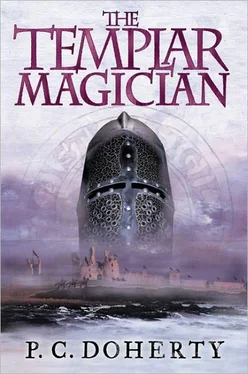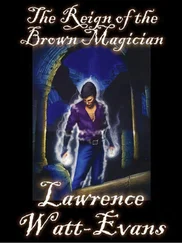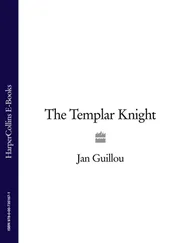P. Doherty - The Templar Magician
Здесь есть возможность читать онлайн «P. Doherty - The Templar Magician» весь текст электронной книги совершенно бесплатно (целиком полную версию без сокращений). В некоторых случаях можно слушать аудио, скачать через торрент в формате fb2 и присутствует краткое содержание. Год выпуска: 2009, ISBN: 2009, Издательство: Headline, Жанр: Исторические приключения, на английском языке. Описание произведения, (предисловие) а так же отзывы посетителей доступны на портале библиотеки ЛибКат.
- Название:The Templar Magician
- Автор:
- Издательство:Headline
- Жанр:
- Год:2009
- ISBN:9780312675028
- Рейтинг книги:3 / 5. Голосов: 1
-
Избранное:Добавить в избранное
- Отзывы:
-
Ваша оценка:
- 60
- 1
- 2
- 3
- 4
- 5
The Templar Magician: краткое содержание, описание и аннотация
Предлагаем к чтению аннотацию, описание, краткое содержание или предисловие (зависит от того, что написал сам автор книги «The Templar Magician»). Если вы не нашли необходимую информацию о книге — напишите в комментариях, мы постараемся отыскать её.
The Templar Magician — читать онлайн бесплатно полную книгу (весь текст) целиком
Ниже представлен текст книги, разбитый по страницам. Система сохранения места последней прочитанной страницы, позволяет с удобством читать онлайн бесплатно книгу «The Templar Magician», без необходимости каждый раз заново искать на чём Вы остановились. Поставьте закладку, и сможете в любой момент перейти на страницу, на которой закончили чтение.
Интервал:
Закладка:
‘Stay calm, Templar!’ The count’s powerful voice forced de Payens to twist round in the saddle. The Templar nodded politely at Raymond even as he regretted not wearing his mail hauberk and chausses; nothing but lightweight boots, quilted jerkin and hose beneath the white Templar mantle sewn with its red cross. On his back was slung a concave shield, around his waist a simple leather sword belt with scabbards for sword and dagger. Was this enough protection if such hurled invective gave way to violence? De Payens twisted his neck against the bubbles of sweat beneath his long hair. He clutched the reins between his quilted mittens and murmured the Templar prayer: ‘ Non nobis, Domine, non nobis, sed nomini tuo da gloriam ’ — not to us, oh Lord, not unto us, but unto yourself give glory.
He must remember he was a Poor Knight of the Temple, dedicated to poverty, obedience and chastity. He had sworn to follow the Templar cross in unblemished fealty to his Grand Master, which was why he and Mayele were here. For the last few months they’d been garrisoned at Chastel Blanc, a Templar fortress to the south of Tripoli. From there they’d been summoned to escort Count Raymond down into Jerusalem. Edmund was impatient. He was glad to be free of the grim routine of Chastel Blanc, eager to see Jerusalem again, but he quickly remembered how this mission was his prime duty. He was bound by oath. The Templars had been founded to patrol the highways of Outremer, Palestine, the land of Le Bon Seigneur. Jesus Christ, God incarnate, had walked, slept, eaten, talked to his friends, preached, died and risen again on this very soil. Nevertheless, de Payens felt a disquieting anxiety clawing at his heart and dulling his brain. Tripoli was noisy and frenetic, a sea of shifting colours, constant dust haze, strengthening heat and marauding flies. His body was soaked in sweat, his horse restless. The crowd on either side could house enemies as well as friends.
‘Stay awake.’ Mayele leaned over in a gust of sweat and ale. ‘Stay awake, Edmund, for ye know not the day nor the hour; it will come like a thief in the night!’
De Payens blinked away the beads of perspiration and licked his sand- and salt-caked lips. The heat was closing in around him like a thick blanket. He must not, as he often did in such circumstances, dream about his grandparents’ house, its whitewashed coolness among the cypress and olive groves of northern Lebanon. He stirred restlessly in his saddle, tapped the hilt of his sword, slid his dagger in and out. The procession was now swinging its way down the main thoroughfare towards the great walled gate, above which the banners of Tripoli flapped between the gibbets ranged along the turreted walkway. Each scaffold bore a cadaver hanging by its neck, a proclamation pinned to its chest. This had become the gruesome feeding ground for kites, buzzards and vultures, their blood-splattered wings wafting away the black swarm of flies dancing against the light.
The noise grew deafening. Horses and donkeys brayed at the sweet smell of water. The clatter of pots and pans, the dull booming of kettle drums, the chatter in a myriad of tongues as traders called and beckoned was constant. The crowd broke like a shoal of multicoloured fish around the sea of stalls. A woman caught Edmund’s eye. Her raven-black hair fringed a broad, smooth forehead, with arched brows over lustrous eyes. The bottom half of her face was hidden by a bead-laced gauze veil, which only enhanced her mysterious beauty. She smiled at him. Edmund felt his interest quicken, then he glanced away as if distracted by a group of Jews in their long dark shubas, who slipped out of a side street to mingle with long-haired Maronites from Syria and dark-skinned Copts from the fabled land south of the Nile. From a nearby church floated the faint hum of plainchant and the spicy fragrance of incense.
The singing grew louder as Greek priests made their way through the crowd, blessing the rabble of dirty children as they bore their precious icons and statues, all arrayed in costly garments and flashing precious stones, to some shrine or chapel. Behind these a line of camels, heavily burdened and swaying like carracks on the sea, battled against the throng, their drivers and guides screaming for room.
De Payens did his best to ignore all these. They were now close to the gates, where Count Raymond’s mercenaries were marshalled, soft Provençal voices mingling with the guttural tongue of Swabia. Nearby, carpenters and blacksmiths created a raucous clatter of axe, hammer and sword. Trumpets rang. Cymbals clashed. Kettle drums rolled in greeting. The mercenaries arranged themselves into ranks to greet their seigneur, as the sun reached its zenith on a day about to crack and crumble into a welter of killing and bloodshed.
De Payens startled as a flock of pigeons swooped low above him. Mayele swore loudly. Edmund turned in his saddle. A group of Maronite priests garbed in dark brown robes, braided black hair hiding their faces, had appeared, holding petitions for Count Raymond. The Lord of Tripoli gestured at them to approach. The Maronites hastened on, like a pack of hounds, hot and keen on the scent. They closed in around the Frankish lord and his principal knight, screaming their blood lust. Assassins! The count and his henchman became slightly separated; their escort surged forward. De Payens and Mayele turned their horses in alarm — too late! The assassins had dropped all pretence, the white scraps of parchment fluttering away like butterflies. They drew long curved daggers decorated with red ribbon; these cut the air, gashing and slicing the count, all unprotected in his hose, cotehardie, cloak and soft boots. He and his henchman had no time even to mutter the Miserere, let alone draw sword or dagger. The assassins circled them, knives tearing and gouging, blood spurting out like wine from a skin. The daggers rose and fell like flailing rods. De Payens drew his own sword. Mayele, yelling the Templar war cry, ‘ Beauséant! Beauséant! ’ lashed out at the crowd milling about them. Their horses skittered, alarmed at the tang of fresh blood, this sudden violence. The count was now falling, drooping down over his horse’s neck. Still the knives scythed the air in glittering arcs. Two of the assassins broke away and sped towards de Payens. The Templar urged his horse forward, crashing into the pair, his sword hacking and twisting as he shouted prayers, curses and battle cries. The blood frenzy overwhelmed him, the song of his sword, the sheer exuberance of the clash, with more assassins now swarming around him. They had finished with the count and were intent on joining their comrades in killing this hated Templar. De Payens’ battle fury became a red mist. He turned his horse, its sharpened hooves lashing out, and the assassins promptly broke and fled into the crowd.
Count Raymond’s constables, now recovering from their shock, were eager for blood. They did not pursue the assassins but like Mayele struck at anyone within sword reach. They swept into the terrified crowd like reapers, cutting, gashing and smashing with mace, axe and sword. Some of the bystanders fought back; the massacre spread like some demonic black cloud. The garrison from the gatehouse walls, blood-hungry mercenaries, needed no second urging.
‘Let the ravens and vultures feast!’ Mayele screamed as he swept into a group of merchants and camel traders.
De Payens, now free of his battle lust, stared around in horror. Count Raymond’s corpse and that of his henchman, both swimming in blood, were being carried away wrapped in their cloaks. On either side of the thoroughfare the killing swirled swift and sudden like a breeze across the sands. Archers on the wall and the gateways darkened the sky, showering the fleeing crowd with a hail of bolts and arrows. Swords red to the hilt glittered and flashed. The dust-choked cobbles became drenched with blood pouring from severed limbs. Decapitated heads rolled like dirty bushweed across the ground. The white walls of buildings grew splattered with splashes of scarlet as if a gory rain was pelting down. Children screamed in terror. Plumes of black smoke curled up against the blue sky. The mayhem was spreading deep into the city. People fled into houses and churches.
Читать дальшеИнтервал:
Закладка:
Похожие книги на «The Templar Magician»
Представляем Вашему вниманию похожие книги на «The Templar Magician» списком для выбора. Мы отобрали схожую по названию и смыслу литературу в надежде предоставить читателям больше вариантов отыскать новые, интересные, ещё непрочитанные произведения.
Обсуждение, отзывы о книге «The Templar Magician» и просто собственные мнения читателей. Оставьте ваши комментарии, напишите, что Вы думаете о произведении, его смысле или главных героях. Укажите что конкретно понравилось, а что нет, и почему Вы так считаете.












